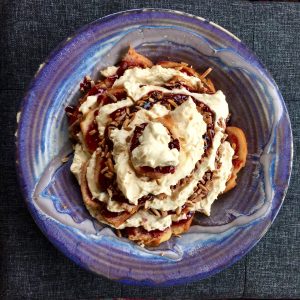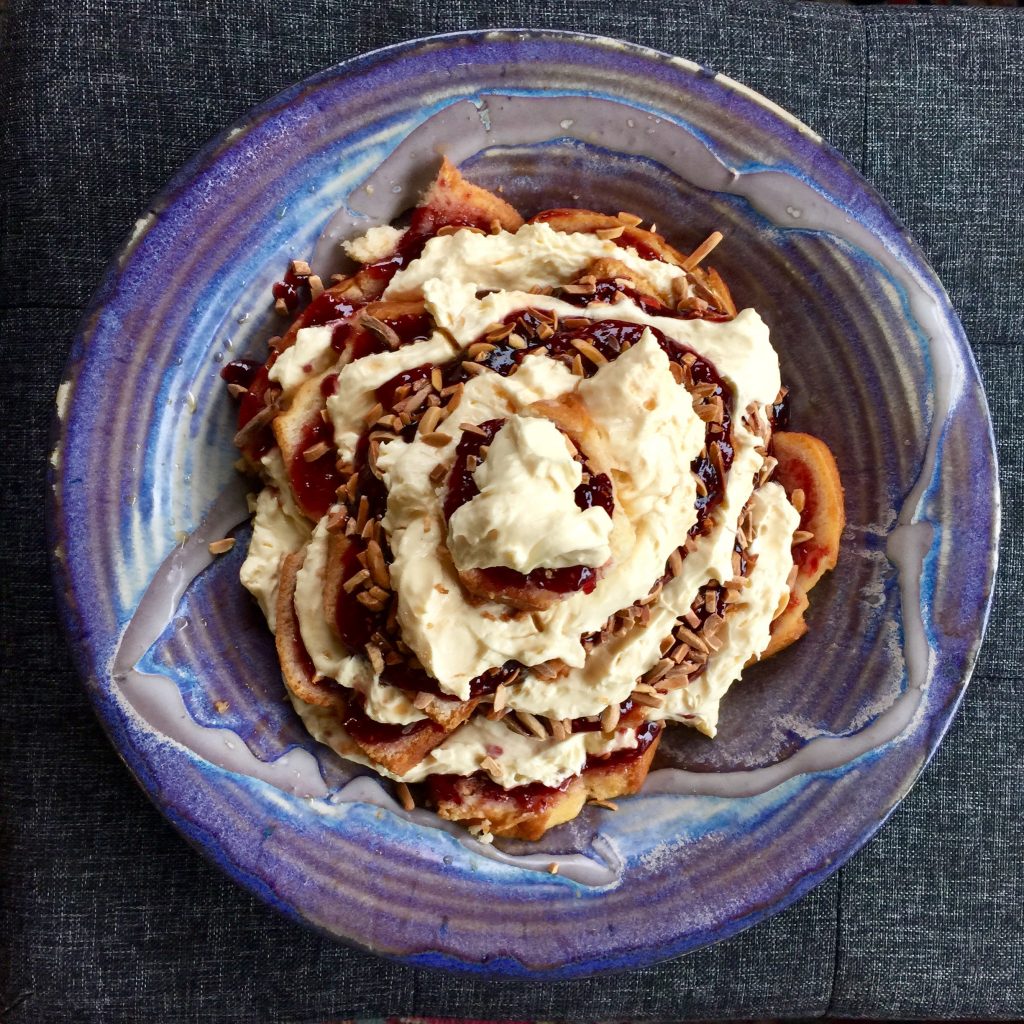
This originally appeared as part of the Daily Sip, a website from Charles LaFond, a spiritual companion, author, potter and fundraiser who lives on the edge of the sea with his dog Kai. offering regular meditations and reflections on spirituality and church fundraising
Hannah Glasse’s 1751 cookbook The Art of Cookery Made Plain and Simple includes the classic English Trifle. In colonial America, Amelia Simmons adapted the dessert recipe in 1796 to allow for Colonial realities and still used the “f” in place of the “s’” as was the custom in 18th-century prose. But of course, as my own British mother explained to me as a child, it has no recipe. It is simply a series of layers of leftovers, recast into a wonderful dessert. In the 1860s, Oliver Wendell Holmes mentions the dessert “That most wonderful object of domestic art called trifle with its charming confusion of cream and cake and almonds and jam and jelly and wine and cinnamon and froth.”
I recently made a trifle for a mid-morning coffee with some friends. Two live here on Whidbey Island near to me and Kai. Three others came from “America” as we call the mainland. I am not a baker (it requires math skills made virtually impossible, I suspect, from ancestral British in-breeding) and so I assembled a delight we call “a trifle.” I had some leftover cake and some leftover toasted almonds from a trout almandine I had made the previous week. I used a jello and cream recipe from my friend Dianne ( whip one package of vanilla pudding with a teaspoon of almond extract, two cups of heavy whipping cream (no less than 36%) and one cup milk until it is stiff with peaks and refrigerate…it is also AMAZING on fruit…or with a spoon at 3:00 am in front of an open refrigerator while wearing boxers. (Just saying.)

The trifle pictured above, in one of my own ceramic bowls (a favorite of cobalt and shino glazes) was the result. A layer of cake, then some sprinkled sherry or Grand Marnier, then jam (I like raspberry) and a layer of pudding-whipped cream (or if you are a purist…a layer of pudding and then a layer of whipped cream …but puritanism is exhausting.) Then sprinkle the browned almond quarters (cold) and begin the layering again (cake, alcohol, jam, cream-pudding, nuts…repeat.) serve it by big-spooning it into a bowl, remembering to cut down to get all the layers.
The dish is impossible to get wrong, is cheap to make, and is usually just made with assembled “whatever is in the house at the time.” One time I made a ginger pear trifle because I had gingerbread and pear jam and a ginger liquor (Canton) in the house. My guests thought I had created a masterpiece when all I had done, really, was assemble the leftovers into something quite magnificent without spending a dime or more than 5 minutes on it. The word Trifle comes from the French word “trufle” which meant “something whimsical.”
Life can be like that. We can use the leftovers to make something quite wonderful and we can make it wonderful by making it whimsical. I do not think I am alone when I say that we are all trying so hard to get this right. Life, that is. And then if you add the effort involved in being a Christian or a Jew or a devotee of just about any religion – there are all those rules to obey. Not to mention the fear that if you get it wrong, some divine old man in the sky will smite you. Or at least scorch your privates with a carefully applied bolt of lightning. Or shame you on-line by coaching some afhole (colonial spelling.)
But what if we do not need to worry so much about pleasing an angry God? Indeed, what if It is not even angry? What if It likes us? At least as much as bunnies, trees, deer and pink porpoises. And that blade of grass over there. And that guy you hate.
What if a trifle is enough? What if we are all just doing our best to walk each other home? What if what we have “around the house” is enough to assemble a more than adequate yummy life to go with a good cup of tea among friends? What if, as hard as life can be sometimes, we have what we need already?

